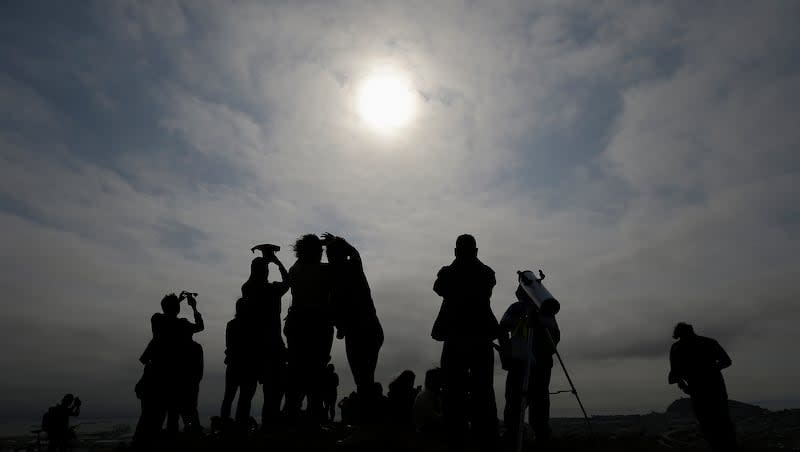The religious significance of the solar eclipse

This article was first published in the State of Faith newsletter. Sign up to receive the newsletter in your inbox each Monday night.
Many faith groups see next week’s solar eclipse as a chance to connect with their neighbors. They’re embracing the occasion rather than dreading it, unlike their predecessors from the distant past.
In ancient times, eclipses were generally interpreted as expressions of the gods’ displeasure, according to USA Today. People of faith would respond to them with desperate prayers, rather than with viewing parties.
“What we today see as an astronomical event, people previously interpreted as having life-and-death significance,” said James Willis, an assistant professor of practice for religion at the University of Indianapolis, to USA Today.
To be sure, solar eclipses are still seen as religiously significant by many believers, but not in the same way.
Modern people of faith describe astronomical events as a chance to celebrate the power of God, not to cower from it.
“An eclipse is yet another opportunity to witness the handiwork of God that exists in the universe,” said Eric Moffett, lead pastor of Coryell Community Church, to USA Today. “We aren’t looking for any omens in the cosmos, but we are using this as an opportunity to, for a little over four minutes, be reminded that we live in (a) world made by God and sustained by his love and goodness.”
Monday’s eclipse is also an opportunity for faith groups to strengthen community relationships by, for example, handing out free eclipse glasses or hosting eclipse events on church property.
Wesley United Methodist Church in Greenville, Texas, is partnering with science experts in its area to educate community members about the science behind eclipses during an event the day before the eclipse. Church members will be trained to speak with visitors about what’s happening in outer space.
“Guests may expect Jesus’ hospitality and the excitement of learning about God’s handiwork of creation,” said the Rev. Chris Yost, the church’s pastor, to United Methodist News.
Monday’s total solar eclipse will take place in the early afternoon on Monday, April 8. The path of totality travels across Texas, Arkansas and much of the Midwest and Northeast, according to Time.
“The eclipse will enter the United States in Texas, and travel through Oklahoma, Arkansas, Missouri, Illinois, Kentucky, Indiana, Ohio, Pennsylvania, New York, Vermont, New Hampshire, and Maine. Small parts of Tennessee and Michigan will also experience the total solar eclipse,” Time reported.
Remember that it’s unsafe to look directly at the sun, even during an eclipse. Check stores, libraries and, yes, churches in your area for eclipse glasses.
Fresh off the press
Why Americans go to church — especially on Easter
What are prop bets, and why does the NCAA want to ban them?
Supreme Court appears likely to protect access to abortion pill
Term of the week: Easter Act of 1928
Easter, as I’m sure you’ve noticed, does not have a fixed date. It jumps around on the calendar from year to year because its timing is based on the moon.
From time to time, religious and political leaders have debated assigning a fixed date to the holiday in hopes of reducing confusion and making it easier for communities to develop annual Easter traditions.
In 1928, the United Kingdom actually passed a law that assigned the holiday to “the first Sunday after the second Saturday in April,” according to the Who Runs Britain? blog, but the law was never brought into effect.
This year, the Easter Act of 1928 was in the headlines again after a former U.K. leader spoke out about why it should be activated and enforced.
Sir Greg Knight said that ensuring Easter falls sometime in mid-April would “benefit families and businesses by introducing predictability and increasing the chance of experiencing pleasant spring weather during Easter festivities,” per Premier Christian News.
What I’m reading ...
One year after the shooting at Covenant School in Nashville, The Associated Press met with many members of the school community to talk about how the tragedy changed their lives. The resulting article is a beautiful tribute to the healing power of friendship.
In 2015, I had the opportunity to travel to Chimayo, New Mexico, during Holy Week and write about the area’s famous pilgrimage. A recent explainer from The Conversation about Chimayo’s enduring appeal brought back fond memories of my trip.
Odds and ends
Don’t miss my colleague Emma Pitts’ story about the love lives of penguins at an aquarium in Draper, Utah.
I know Easter is over, but there’s still time to enjoy the photos of this year’s winners in The Washington Post’s annual Peeps diorama contest.

